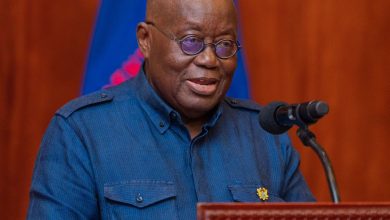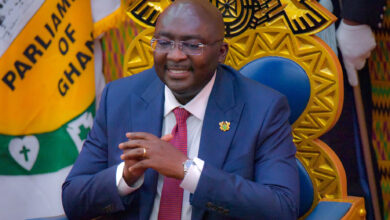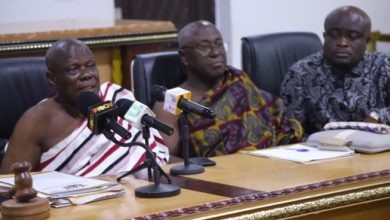EC uncomfortable with foreign firm handling Ghana’s biometric system

Mrs Jean Adukwei Mensa, the Chairperson of the Electoral Commission (EC), on Wednesday, expressed concerns over the control of the Commission’s biometric system and Data Centre equipment by a foreign firm, saying it is risky to the country’s sovereign rights.
Additionally, the Commission’s Information Technology staff were not trained to operate the biometric registration devices (BVDs) and often relied on the foreign vendors to repair them at a huge cost.
She revealed that last year alone, the foreign vendor took a colossal amount of four million dollars for maintenance works of the EC’s biometric kits, noting that, the contract signed by the previous management with the foreign vendors was unsustainable and a drained the country’s purse.
The EC Chairperson said this when she led a delegation of Commissioners to pay a courtesy call on the Management of Peace FM, a subsidiary of the Despite Group of Companies (DGCs) in Accra.
“Our biometric systems had ever been controlled by the foreign vendors and it was the worst thing to have happened to a country and risky to the country’s sovereignty,” the EC Chair noted.
Ghana’s election management body’s biometric data is managed by Superlock Technology Limited (STL), an Israeli IT firm, contracted by the previous EC Management for maintenance of its software and Data Centre equipment.
The visit sought to build partnerships with key stakeholders and support towards the implementation of the Commission’s activities, especially in the area of information dissemination.
The EC Chair was accompanied by two of her two deputies-Mr Samuel Tettey, in-charge of Operations and Dr Eric Bossman Asare, in-charge of Corporate Services.
The EC’s Delegation was jointly received by Mr Fadda Dickson, the Managing Director of the DGCs, Mr Kennedy Asante Osei, the General Manager of the DGCs and Mr Kwami Sefa Kayi, Host of Peace FM’s Morning Show-Kokrokoo.
Mrs Mensa noted that since foreign vendors controlled the EC’s biometric system, they could reject the Commission’s timetable for organising an election or national exercise and that could jeopardise the country’s electoral process.
In view of that, she said the Commission had started auditing of its systems and processes and cleaned 13,000 of the BVDs to ensure judicious use of resources to promote efficiency and help entrench multi-party democracy in the country.
Giving a run-down of events, Mrs Mensa said when current EC Management assumed office, last year; it met a financial and technical proposal of US$56 million from its foreign vendors, intended for the refurbishment of the EC’s biometric verification devices and data centre.
She said it consulted the biometric specialist who installed the Commission’s IT infrastructure in 2011 for advice on the way forward.
Upon assessment of the old IT infrastructure, she said the IT specialist told them that the cost for the refurbishment was too expensive and unsustainable.
More so, the biometric devices recommended by the vendors to the EC to purchase was obsolete, expensive and inefficient.
The consultant advised the Commission to open for a competitive bidding process to allow other firms with modern technologies to bid.
In view of that, the EC Chair gave the assurance that the Commission would opt for modern registration devices that could perform multiple functions, which is less expensive and user-friendly than what was recommended by the vendors.
Mrs Mensa also gave a run-down of some activities it had undertaken since assumption of office in August last year and some activities earmarked for implementation in the ensuing months towards 2020 polls.
She gave the assurance that the EC would not prevent any eligible Ghanaian from exercising his or her franchise and would at all times put systems in place to promote democracy and uphold the will and sovereignty of the people.
Mr Tettey said the EC was implementing the Chief Justice’s Committee to clampdown on its loopholes and administrative lapses to ensure more transparent and credible electoral processes.
Dr Bossman Asare lamented the huge cost incurred in conducting an election, saying that EC spent 12 dollars per person during elections.
Therefore, the Commission was instituting measures to ensure value for money, assuring that utilisation of modern electoral technologies could save the nation US20 million dollars.
Responding to former President Mahama’s concerns that the EC Chairperson could rig the 2020 Elections, Dr Bossman Asare asked the former President, who is also the Presidential Candidate of the NDC not to fear since there were adequate structures in place to promote fair, transparent and credible elections.
He said from the polling stations to the collation centres and printing of ballot papers, the representatives of the political parties were allowed to monitor the processes, while the Bureau of National Investigations, police personnel, civil society organisations and foreign observers were given unfettered access to the electoral process.
He asked anyone with information about how an election could be rigged to assist the election management body to halt it.
The EC Chair presented a copy of the EC election guidelines and activities earmarked for implementation to the Management of Peace FM.





